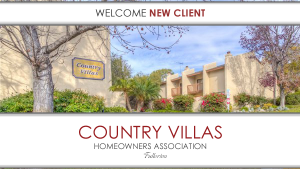 Board Members are tasked with the difficult job of enforcing the Association’s rules and regulations against non-compliant Members. Unfortunately, this often creates tension between Board Members and Members. In some circumstances, this tension turns into unlawful harassment. When this occurs, Board Members should consider the available legal remedies provided under both California law and their homeowners association’s governing documents in order to protect themselves and abate the harassing conduct.
Board Members are tasked with the difficult job of enforcing the Association’s rules and regulations against non-compliant Members. Unfortunately, this often creates tension between Board Members and Members. In some circumstances, this tension turns into unlawful harassment. When this occurs, Board Members should consider the available legal remedies provided under both California law and their homeowners association’s governing documents in order to protect themselves and abate the harassing conduct.
Generally speaking, a restraining order will provide Board Members with the most immediate relief and protection. This is because the California Code of Civil Procedure requires judges to review and rule on requests for Temporary Restraining Orders within the next business day of filing for the same. (Cal. Code Civ. Proc., § 527.6(e).) (Although, Temporary Restraining Orders only remain in effect for a period not to exceed twenty-one [21] days. Before issuing Permanent Restraining Orders, courts must first allow the parties to present their sides of the story at hearings.)
There are two types of restraining orders that Board Members may consider depending on the nature of the alleged harassing conduct. The most common type of restraining order is a Civil Harassment Restraining Order. To prevail and receive a Civil Harassment Restraining Order, the Board Member must prove that the alleged harasser engaged in one of the following forms of unlawful harassment:
- unlawful violence (i.e., assault, battery or stalking as defined by the California Penal Code);
- a credible threat of violence (i.e., a statement or course of conduct that places a reasonable person in fear for their safety or the safety of their immediate family, and that serves no legitimate purpose); or
- a course of conduct directed at the Board Member that seriously alarms, annoys, or harasses the Board Member and causes the Board Member to suffer from substantial emotional distress (and would also cause a reasonable person to suffer substantial emotional distress), and that serves no legitimate purpose.
On the other hand, homeowners associations (as corporations) may consider filing Workplace Violence Restraining Orders against the alleged harasser on behalf of its Board Members. According to the California Code of Civil Procedure, Board Members are considered “employees” of homeowners associations for the limited purpose of Workplace Violence Restraining Orders. (Cal. Code Civ. Proc., §527.8(b)(3).) To prevail and receive a Workplace Violence Restraining Order, the homeowners association must prove that the Board Members (or any other employee as defined by the Code of Civil Procedure) suffered:
- unlawful violence (i.e., assault, battery or stalking as defined by the California Penal Code); or
- a credible threat of violence (i.e., a statement or course of conduct that places a reasonable person in fear for their safety or the safety of their immediate family), that can reasonably be construed to be carried out or to have been carried out at the workplace, and that serves no legitimate purpose.
If after a hearing on the merits, the Court finds that unlawful harassment has taken place, then the judge may issue a Permanent Civil Harassment Restraining Order for up to five (5) years or a Workplace Violence Restraining Order for up to three (3) years. However, the Code of Civil Procedure only permits Courts to award the prevailing party its attorneys’ fees and costs in lawsuits for Civil Harassment Restraining Orders, not Workplace Violence Restraining Orders.
Finally, in some circumstances, a Member’s harassing conduct toward the Board may constitute a nuisance, as defined by the homeowners association’s CC&Rs. In those situations, the homeowners association may consider bringing an unlimited civil action lawsuit against the offending Member to enforce the homeowners association’s governing documents. Board Members should keep in mind that this type of civil litigation is often more costly and the potential relief is not usually as immediate. Furthermore, the alleged harassment must satisfy the definition of a “nuisance,” as set forth in the governing documents.
 |
If Board Members believe that they are being harassed as a result of their service on the Board of Directors, they should consult with the Association’s general counsel to determine the most effective way to address the problem. Each situation must be evaluated on a case-by-case basis to determine whether the facts meet the legal definition of “unlawful harassment” or a “nuisance.” Of course, Board Members should immediately contact their local law enforcement agencies if they believe that their safety and wellbeing is at risk. |
-Blog post authored by TLG Attorney, Sarah A. Kyriakedes, Esq.
 It’s our privilege to welcome California Court Community Association to Tinnelly Law Group’s growing family of HOA clients.
It’s our privilege to welcome California Court Community Association to Tinnelly Law Group’s growing family of HOA clients. HOA Lawyer Blog
HOA Lawyer Blog


 It’s our privilege to welcome The Cottages on 4th Community Owners Association to Tinnelly Law Group’s growing family of HOA clients.
It’s our privilege to welcome The Cottages on 4th Community Owners Association to Tinnelly Law Group’s growing family of HOA clients. Asked – Our Board of Directors has been seeking to switch out a vendor for some time, but we have been waiting for the current contract to expire. It has become known that the current vendor contract automatically “renewed” for another 5-year period because we did not provide notice of our intent to terminate at least 90 days before the contract expired. This termination notice period was required under the terms of the agreement, but we were unaware of it until it was too late. Is there anything we can do to get out from under this contract?
Asked – Our Board of Directors has been seeking to switch out a vendor for some time, but we have been waiting for the current contract to expire. It has become known that the current vendor contract automatically “renewed” for another 5-year period because we did not provide notice of our intent to terminate at least 90 days before the contract expired. This termination notice period was required under the terms of the agreement, but we were unaware of it until it was too late. Is there anything we can do to get out from under this contract?  It’s our privilege to welcome Newfield Homeowners Association to Tinnelly Law Group’s growing family of HOA clients.
It’s our privilege to welcome Newfield Homeowners Association to Tinnelly Law Group’s growing family of HOA clients. It’s our privilege to welcome Country Villas Homeowners Association to Tinnelly Law Group’s growing family of HOA clients.
It’s our privilege to welcome Country Villas Homeowners Association to Tinnelly Law Group’s growing family of HOA clients. *Asked and Answered
*Asked and Answered It’s our privilege to welcome Huntington Pier Colony Condominium Homeowners’ Association to Tinnelly Law Group’s growing family of HOA clients.
It’s our privilege to welcome Huntington Pier Colony Condominium Homeowners’ Association to Tinnelly Law Group’s growing family of HOA clients. In case you missed it,
In case you missed it,  It’s our privilege to welcome Turnleaf at the Seasons Neighborhood Association to Tinnelly Law Group’s growing family of HOA clients.
It’s our privilege to welcome Turnleaf at the Seasons Neighborhood Association to Tinnelly Law Group’s growing family of HOA clients. Board Members are tasked with the difficult job of enforcing the Association’s rules and regulations against non-compliant Members. Unfortunately, this often creates tension between Board Members and Members. In some circumstances, this tension turns into unlawful harassment. When this occurs, Board Members should consider the available legal remedies provided under both California law and their homeowners association’s
Board Members are tasked with the difficult job of enforcing the Association’s rules and regulations against non-compliant Members. Unfortunately, this often creates tension between Board Members and Members. In some circumstances, this tension turns into unlawful harassment. When this occurs, Board Members should consider the available legal remedies provided under both California law and their homeowners association’s